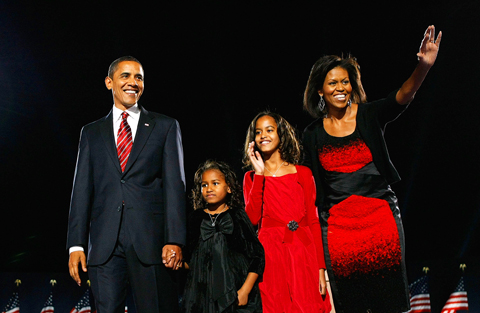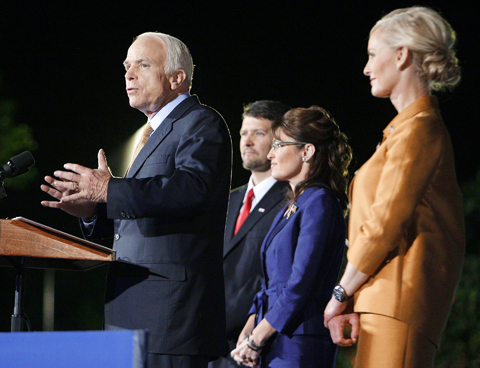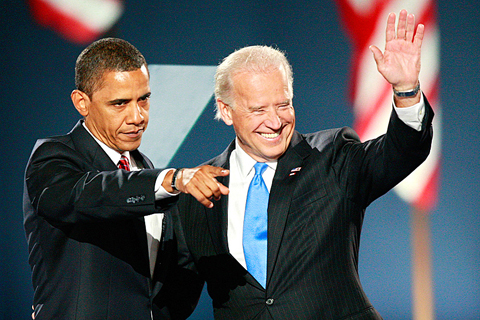A triumphant US Democratic Senator Barack Obama vowed to be a president for all America and asked for patience to address the nation’s problems of war and finance that he called the greatest challenges of a lifetime.
The first black US president-elect cast his election as a defining moment in the country’s 232-year history and a rebuke to cynicism, fear and doubt.
“If there is anyone out there who still doubts that America is a place where all things are possible; who still wonders if the dream of our founders is alive in our time; who still questions the power of our democracy, tonight is your answer,” he said in his first public words after winning the election.

PHOTO: AFP
His victory speech was delivered before a crowd that city officials estimated at 125,000 in Grant Park, Chicago, and possibly thousands more in the surrounding area. Many cried and nodded their heads while he spoke.
He appeared on stage with his wife, Michelle, and daughters Malia, 10, and Sasha, 7.
“Even as we celebrate tonight, we know the challenges that tomorrow will bring are the greatest of our lifetime — two wars, a planet in peril, the worst financial crisis in a century,” he said.

PHOTO: AP
The election of Obama, the son of a black Kenyan man and a white Kansan woman, is a remarkable turning point for a nation that denied the vote to many African-Americans just decades ago.
STATE BY STATE
Obama tore up the US political map as he defeated John McCain, the veteran Republican senator who had struggled vainly to distance himself from US President George W. Bush’s unpopular presidency.

PHOTO: AFP
Obama captured states once seen as Republican strongholds, including Florida, Indiana and Virginia, while defending all traditionally Democratic states.
In addition, Ohio, Iowa, New Mexico, Colorado and Nevada — all of which went to Bush in 2004 — turned Democratic in this year’s presidential election.
Obama scored a decisive win in the electoral vote, the state-by-state tally that determines the winner. Needing 270 votes to claim the presidency, Obama had 349 to McCain’s 147, with three states still too close to call. By comparison, Bush won the White House twice and never tallied more than 286 electoral votes.
The largely symbolic popular vote was much closer: Obama had 51.7 percent to 47 percent with 84 percent of all precincts tallied.
VOTER TURNOUT
Americans voted in record numbers, standing in lines that snaked around blocks and in some places in pouring rain.
Voters who lined up on Tuesday and the millions who balloted early propelled this election to what one expert said was the highest turnout in a century.
It looks like 136.6 million Americans will have voted for the president this election, based on 88 percent of the country’s precincts tallied and projections for absentee ballots, Michael McDonald of George Mason University said.
Using his methods, that would give this year’s election a 64.1 percent turnout rate.
“That would be the highest turnout rate that we’ve seen since 1908,” which was 65.7 percent, McDonald said early yesterday.
The 1908 race elected William Howard Taft over William Jennings Bryan.
But another expert put this year as the best in 40 years. Different experts calculate turnout rates in different ways based on whom they consider eligible voters.
Curtis Gans, director of the nonpartisan Committee for the Study of the American Electorate at American University, said his early numbers showed this year to be about equal to or better than 1964, but not higher than 1960.
He said it looked like total votes, once absentees were tallied, would be “somewhere between 134 and 135 million.”
What’s most interesting about early results is not just how many people voted, but the shifting demographic of US voters, said Stephen Ansolabehere, a political science professor at Harvard and MIT.
Using exit polling data, Ansolabehere determined that whites made up 74 percent of this year’s electorate. That’s down considerably from 81 percent in 2000 because of an increase in black and Hispanic voting, he said.
“That’s a big shift in terms of demographic composition of the electorate,” Ansolabehere said early yesterday.
Breakdown by party voting also showed that Republican turnout rates were down quite a bit, while Democratic turnout rates were up, Gans said.
Republican states such as Wyoming and South Dakota saw turnout drop.
“I think they were discouraged,” Gans said.
Experts pointed to a weak economy and a lively campaign that promised a history-making result for the high turnout.
North Carolina set a record for its highest turnout rate of eligible voters, because of close presidential, Senate and gubernatorial races, Gans said. Other states where turnout increased were Indiana, Delaware, Virginia and Alabama. The District of Columbia also set a record, he said.
Ansolabehere said young voters didn’t show up in the advertised wave, but others disagreed.
“Young voters have dispelled the notion of an apathetic generation and proved the pundits, reporters and political parties wrong by voting in record numbers today,” said Heather Smith, the executive director of Rock the Vote. “The Millennial generation is making their mark on politics and shaping our future.”
MCCAIN CONCEDES
McCain conceded the presidential race to Obama, saying the Democrat had achieved a “great thing” for himself and the country with his historic victory.
Flanked by wife Cindy and running-mate Sarah Palin, McCain spoke to supporters outside the Arizona Biltmore Hotel shortly after 11pm, saying the “American people have spoken and they have spoken clearly.”
He conceded the contest as polls closed on the West Coast, adding a string of states to Obama’s electoral vote tally and sealing the Illinois senator’s victory.
McCain stressed the historic nature of the election, noting that an invitation to black author Booker T. Washington to dine at the White House by Theodore Roosevelt had been viewed as an insult in some quarters.
“Senator Obama has achieved a great thing for himself and for his country,” McCain said.
Although McCain criticized Obama during the hard-fought campaign as too inexperienced to be president, the Arizona senator said that “in a contest as long and as difficult as this campaign has been, his success alone commands my respect for his ability and perseverance.”
“But that he managed to do so by inspiring the hopes of so many millions of Americans who had once wrongly believed that they had little at stake or little influence in the election of an American president is something I deeply admire and commend him for achieving.”
An Obama presidency offers the prospect of a new style and tone in American foreign policy.
Obama has said he will try to withdraw US troops from Iraq in 16 months and has called for a new opening to US adversaries, such as Iran and Cuba. He has urged the closing of the Guantanamo Bay prison and favors cap-and-trade systems to reduce global warming.
Internationally, Obama is hugely popular — a sharp contrast to Bush. Part of his appeal is his personal story that highlights US multiculturalism: Besides his Kenyan father, he has a half-sister who is the daughter of an Indonesian.
In his campaign, Obama mined a deep vein of national discontent, promising Americans hope and change throughout a nearly flawless 21-month campaign for the White House.
He first soared into the national spotlight with his electrifying speech at the 2004 Democratic National Convention, when he was making his first run for the Senate and polishing his message of unity in a country that was mired in partisan anger.
In a grueling primary battle, he managed to raise more money and out-maneuver the candidate once seen as the inevitable nominee, former first lady Hillary Rodham Clinton.
After Obama’s victory on Tuesday, Clinton called her former rival to promise her full support.
“In quiet, solitary acts of citizenship, American voters gave voice to their hopes and their values, voted for change, and refused to be invisible any longer,” she said.
Throughout his campaign, Obama had to overcome relentless false rumors about his religion, his ethnicity and his patriotism. Some pointed to his middle name of Hussein to claim that Obama, a Christian, was Muslim — which would disqualify him in the eyes of many Americans.
In his race against McCain, Obama was steady and focused, keeping attention on the economy — voters’ biggest concern — and linking McCain to Bush.
TAIWAN
President Ma Ying-jeou (馬英九) yesterday congratulated Obama and said Taiwan looked forward to bolstering relations with the US.
“Under the new US president’s outstanding leadership, the long friendship between the US and the Republic of China will continue to strengthen and grow,” a statement released by the Ministry of Foreign Affairs said.
ADDITIONAL REPORTING BY JENNY W. HSU
Also See: What Obama means to US global leadership

The CIA has a message for Chinese government officials worried about their place in Chinese President Xi Jinping’s (習近平) government: Come work with us. The agency released two Mandarin-language videos on social media on Thursday inviting disgruntled officials to contact the CIA. The recruitment videos posted on YouTube and X racked up more than 5 million views combined in their first day. The outreach comes as CIA Director John Ratcliffe has vowed to boost the agency’s use of intelligence from human sources and its focus on China, which has recently targeted US officials with its own espionage operations. The videos are “aimed at

STEADFAST FRIEND: The bills encourage increased Taiwan-US engagement and address China’s distortion of UN Resolution 2758 to isolate Taiwan internationally The Presidential Office yesterday thanked the US House of Representatives for unanimously passing two Taiwan-related bills highlighting its solid support for Taiwan’s democracy and global participation, and for deepening bilateral relations. One of the bills, the Taiwan Assurance Implementation Act, requires the US Department of State to periodically review its guidelines for engagement with Taiwan, and report to the US Congress on the guidelines and plans to lift self-imposed limitations on US-Taiwan engagement. The other bill is the Taiwan International Solidarity Act, which clarifies that UN Resolution 2758 does not address the issue of the representation of Taiwan or its people in

US Indo-Pacific Commander Admiral Samuel Paparo on Friday expressed concern over the rate at which China is diversifying its military exercises, the Financial Times (FT) reported on Saturday. “The rates of change on the depth and breadth of their exercises is the one non-linear effect that I’ve seen in the last year that wakes me up at night or keeps me up at night,” Paparo was quoted by FT as saying while attending the annual Sedona Forum at the McCain Institute in Arizona. Paparo also expressed concern over the speed with which China was expanding its military. While the US

SHIFT: Taiwan’s better-than-expected first-quarter GDP and signs of weakness in the US have driven global capital back to emerging markets, the central bank head said The central bank yesterday blamed market speculation for the steep rise in the local currency, and urged exporters and financial institutions to stay calm and stop panic sell-offs to avoid hurting their own profitability. The nation’s top monetary policymaker said that it would step in, if necessary, to maintain order and stability in the foreign exchange market. The remarks came as the NT dollar yesterday closed up NT$0.919 to NT$30.145 against the US dollar in Taipei trading, after rising as high as NT$29.59 in intraday trading. The local currency has surged 5.85 percent against the greenback over the past two sessions, central